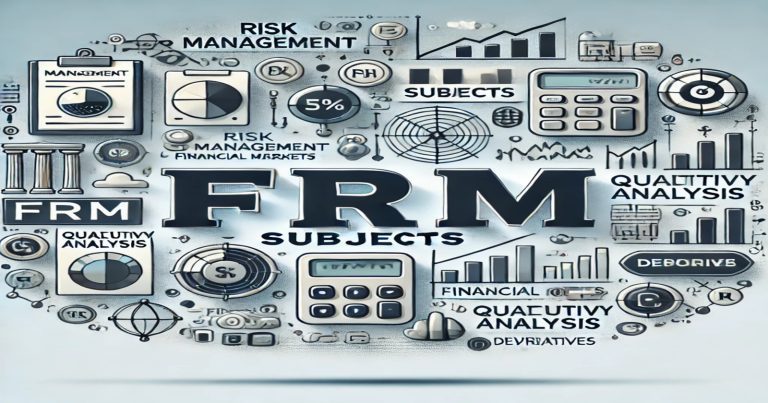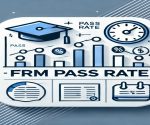FRM subjects comprise the core curriculum for the FRM, which is globally recognized for building advanced skills in risk management for professionals. It consists of two parts: foundations of risk management, quantitative analysis, financial markets, risk models, Credit Risk Measurement and Management and operational risk. Every subject is important for developing the candidate’s skills for identifying, managing, and mitigating risks in financial business. The article will outline the FRM subjects and provide more information on the exam pattern, recommended books, fees, and career prospects.
FRM Subjects
FRM subjects are broadly categorized into two parts: one deals with the theoretical concept, and the other pertains to the practical application of these concepts in financial risk management. Every part has a specific weightage, focusing on various risk analysis areas.
FRM Part 1 Subjects
FRM Part 1 discusses the basics of risk management and consists of four main topics:
- Foundations of Risk Management: Introduction to the risk management process. Concepts like risk appetite, risk governance, and enterprise risk management. Case studies on historical financial disasters and lessons learned.
- Quantitative Analysis: Concepts from statistics: Probability, Regression and Hypothesis Testing Time series analysis, in the context of risk forecasting Formulas for calculating Standard Deviation Correlation Coefficients Covariance.
- Financial Markets and Products: Knowledge of financial instruments, including derivatives, bonds, and equities. Techniques of hedging and their use. Futures, options, and swaps mechanisms.
- Valuation and Risk Models: Pricing of financial assets using valuation models. Techniques for measuring risk, including Value-at-Risk (VaR). Stress testing and scenario analysis of risk assessment.
| FRM Part | FRM Part I Exam Topic | Exam Weight |
| Part 1 | Foundations of Risk Management | 20% |
| Quantitative Analysis | 20% | |
| Financial Markets and Products | 30% | |
| Valuation and Risk Models | 30% | |
| Part 2 | Market Risk Measurement and Management | 20% |
| Credit Risk Measurement and Management | 20% | |
| Operational Risk and Resilience | 20% | |
| Liquidity and Treasury Risk Measurement and Management | 15% | |
| Risk Management and Investment Management | 15% | |
| Current Issues in Financial Markets | 10% |
FRM Part 2 Subjects
FRM Part 2 stresses advanced topics and real-world risk management practices. It consists of five subjects:
- Market Risk Measurement and Management: Techniques to measure market risk, including VaR and stress testing. Managing risks arising from currency and interest rate fluctuations.
- Credit Risk Measurement and Management: Credit rating systems, default probabilities, and credit exposure. Counterparty risk and credit derivatives.
- Operational Risk and Resiliency: Operational risk management frameworks and Basel guidelines. Cybersecurity risks and business continuity planning.
- Risk Management and Investment Management: Portfolio risk management strategies and performance evaluation. Investment theories, such as the Modern Portfolio Theory (MPT).
- Current Issues in Financial Markets: Analysis of emerging risks and trends in financial markets. Real-world case studies on crises and regulatory changes.
FRM Exam Pattern
Understanding the pattern of the FRM exam is crucial for preparing effectively. The exam is divided into two parts. Part 1 consists of 100 multiple-choice questions, takes 4 hours, and encompasses four subjects. Questions are spread out evenly by syllabus weightage. Part 2 consists of 80 multiple-choice questions, which are also for 4 hours, and includes five advanced subjects with application-based questions that check analytical skills.
Questions also vary in terms of difficulty. Some questions only require applying basic formulas, while others require the application of concepts in real-life scenarios. The theoretical chapters have the more challenging questions; therefore, there is a need to study the topics with much emphasis on getting clear concepts.
Overall, the pass rate for the FRM exam is between 40%-60%. Concept clarity needs to be developed, along with the application of concepts to various types of questions. The latter will allow you to address both simple and complex problems in the exam.
| Exam Part | Duration | No. of Questions |
| Part 1 | 4 Hours | 100 |
| Part 2 | 4 Hours | 80 |
FRM Course Fees
The FRM course fee is based on the time of enrollment and the study material. While enrolling for the program, the applicant must pay an initial one-time registration fee of $400 (₹35000 Approx.). Fees for the exam vary based on enrollment time: Early-$600 (₹52000 Approx.); Standard $800(₹70000 Approx.); and Late-$1,000 (₹87000 Approx.). All these fees are paid separately for Part 1 and Part 2.
The Study material can cost about $200–$500 (₹17000-₹44000 Approx.), depending on whether one is purchasing the official GARP material or a third-party package. Preplanning and early registration also reduce the fees paid for the exams. FRM is an excellent investment for the career-building process in risk management.
| Particulars | Fees (Approx.) |
| One-Time Enrollment Fee | ₹35000 |
| Early Registration Fee | ₹52000 |
| Standard Registration Fee | ₹70000 |
| Total Fees | ₹1,57,000 |
FRM Jobs and Salaries
FRM certifications open doors to very lucrative professional career opportunities in financial risk management. The professionals with this professional certification are always in demand for Risk Manager, Financial Analyst, and Treasury Manager roles. Industry-standard salaries for professionals in FRM India also reflect the growing demand for the value of expertise in managing financial risks.
| Job Profiles for FRM Holders | Average Salary in India (₹ LPA) |
| Risk Manager | ₹15–20 LPA |
| Financial Analyst | ₹10–15 LPA |
| Credit Risk Analyst | ₹12–18 LPA |
| Treasury Manager | ₹18–25 LPA |
| Portfolio Manager | ₹20–30 LPA |
FRM Subjects FAQs
1. What are the FRM Part 1 topics?
The FRM Part 1 topics are Foundations of Risk Management, Quantitative Analysis, Financial Markets and Products, and Valuation and Risk Models
2. What are the FRM Part 2 topics?
The FRM Part 2 topics are Market Risk, Credit Risk, Operational Risk, Investment Management, and Current Issues in Financial Markets.
3. How much are all FRM fees?
Total FRM fees include a one-time enrollment fee of $400 and exam registration fees of $600 to $800 per part.
4. Which books are recommended for FRM preparation?
The best books for FRM preparation are GARP’s official study materials, Schweser Notes, and John Hull’s Options, Futures, and Other Derivatives.
5. What are the job opportunities after FRM?
FRM-certified professionals can engage themselves as risk manager, credit analyst, portfolio manager, or market risk analysts. The salaries range from ₹8-20 lakh per year in India.


